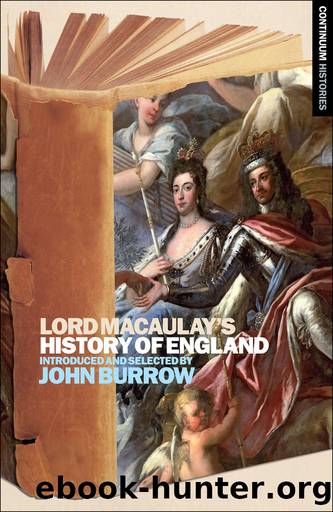Lord Macaulay's History of England by Bloomsbury Publishing

Author:Bloomsbury Publishing [Publishing, Bloomsbury]
Language: eng
Format: epub
Published: 0101-01-01T00:00:00+00:00
On Sunday, the eleventh of November, Burnet preached before the Prince in the Cathedral, and dilated on the signal mercy vouchsafed by God to the English Church and nation. At the same time a singular event happened in a humbler place of worship. Ferguson resolved to preach at the Presbyterian meeting house. The minister and elders would not consent: but the turbulent and halfwitted knave, fancying that the times of Fleetwood and Harrison were come again, forced the door, went through the congregation sword in hand, mounted the pulpit, and there poured forth a fiery invective against the King. The time for such follies had gone by: and this exhibition excited nothing but derision and disgust.
While these things were passing in Devonshire the ferment was great in London. The Princeâs Declaration, in spite of all precautions, was now in every manâs hands. On the sixth of November James, still uncertain on what part of the coast the invaders had landed, summoned the Primate and three other Bishops, Compton of London, White of Peterborough and Sprat of Rochester, to a conference in the closet. The King listened graciously while the prelates made warm professions of loyalty, and assured them that he did not suspect them. âBut where,â said he, âis the paper that you were to bring me?â âSir,â answered Sancroft, âwe have brought no paper. We are not solicitous to clear our fame to the world. It is no new thing to us to be reviled and falsely accused. Our consciences acquit us:Your Majesty acquits us; and we are satisfied.â âYes,â said the King; âbut a declaration from you is necessary to my service.â He then produced a copy of the Princeâs manifesto. âSee,â he said, âhow you are mentioned here.â âSir,â answered one of the Bishops, ânot one person in five hundred believes this manifesto to be genuine.â âNo!â cried the King fiercely: âthen those five hundred would bring the Prince of Orange to cut my throat.â âGod forbid,â exclaimed the prelates in concert. But the Kingâs understanding, never very clear, was now quite bewildered. One of his peculiarities was that, whenever his opinion was not adopted, he fancied that his veracity was questioned. âThis paper not genuine!â he exclaimed, turning over the leaves with his hands. âAm I not worthy to be believed? Is my word not to be taken?â âAt all events, sir,â said one of the Bishops, âthis is not an ecclesiastical matter. It lies within the sphere of the civil power. God has entrusted Your Majesty with the sword: and it is not for us to invade your functions.â Then the Archbishop, with that gentle and temperate malice which inflicts the deepest wounds, declared that he must be excused from setting his hand to any political document. âI and my brethren, sirâ he said, âhave already smarted severely for meddling with affairs of state; and we shall be very cautious how we do so again. We once subscribed a petition of the most harmless kind: we presented it in the most respectful manner; and we found that we had committed a high offence.
Download
This site does not store any files on its server. We only index and link to content provided by other sites. Please contact the content providers to delete copyright contents if any and email us, we'll remove relevant links or contents immediately.
| General | Channel Islands |
| England | Northern Ireland |
| Scotland | Wales |
Room 212 by Kate Stewart(5105)
The Crown by Robert Lacey(4806)
Endurance: Shackleton's Incredible Voyage by Alfred Lansing(4768)
The Iron Duke by The Iron Duke(4349)
The Rape of Nanking by Iris Chang(4202)
Joan of Arc by Mary Gordon(4099)
Killing England by Bill O'Reilly(3995)
Say Nothing by Patrick Radden Keefe(3975)
I'll Give You the Sun by Jandy Nelson(3428)
Shadow of Night by Deborah Harkness(3356)
Hitler's Monsters by Eric Kurlander(3328)
Mary, Queen of Scots, and the Murder of Lord Darnley by Alison Weir(3200)
Blood and Sand by Alex Von Tunzelmann(3194)
Eleanor & Park by Rainbow Rowell(3151)
Darkest Hour by Anthony McCarten(3119)
Margaret Thatcher: The Autobiography by Thatcher Margaret(3079)
Book of Life by Deborah Harkness(2930)
Red Famine: Stalin's War on Ukraine by Anne Applebaum(2927)
The One Memory of Flora Banks by Emily Barr(2856)
